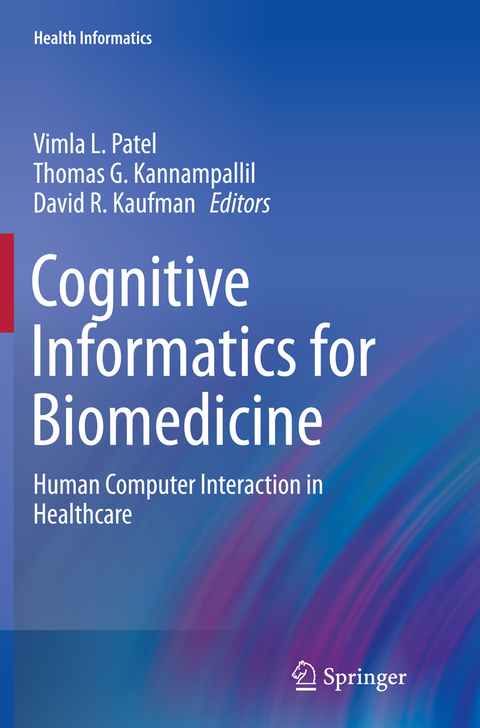
Cognitive Informatics for Biomedicine
Springer International Publishing (Verlag)
978-3-319-35697-6 (ISBN)
Vimla L Patel, PhD, DSc, FRSC, is a Senior Research Scientist and the Director of the Center for Cognitive Studies in Medicine and Public Health at the New York Academy of Medicine. She is an adjunct professor of Biomedical Informatics at Columbia University and of Public Health at Weill Cornell College of Medicine. Her studies focus on complexity of the distributed cognitive system, generation of medical errors, the impact of technology on human cognition, and resulting insights on how to design a safer clinical workplace. She currently teaches a course on human factors and human computer Interaction with Dr Kaufman to graduate students in biomedical informatics and computer science. Thomas G. Kannampallil is a researcher and assistant director at the Center for Cognitive Studies in Medicine and Public Health at the New York Academy of Medicine. With a varied background in computational cognitive science, psychology, statistics and computer science, his research focuses on applying computational, algorithmic and network-based techniques in analyzing the microstructure of human behavior in dynamic, complex environments. These techniques are used to understand and characterize human interactive human behavior, work practices and strategies, and build cognitive support systems that can improve help in making more effective decisions, reducing errors and improving human performance in complex environments. David R. Kaufman, PhD is an Associate Professor at Arizona State University. Dr. Kaufman’s primary research interests include 1) human computer interaction in the context of health information technologies, 2) information seeking behavior and decision making in healthcare contexts, especially as it relates to the elderly, digital divide and low literacy populations, and 3) conceptual understanding of biomedical information and decision making by lay people.
Book Overview: Role of HCI in biomedicine and healthcare.- HCI, Human Factors, Patient Safety and Quality.- Theories and Foundations of HCI: Cognition.- Theories and Foundations of HCI: Communication.- Theories and Foundations of HCI: Distributed Clinical Work.- Methods of Evaluation.- New approaches to representing and analyzing human computer interactions.- User Interfaces.- Medical devices.- Application of Usability Evaluation in Healthcare Settings.- Visualization in Biomedical Informatics: Tools and Applications in the Clinical Environment.- Face-to-face synchronous and asynchronous interactions in clinical settings.- Team Activities and Processes.- Mobile Health Applications and Biomedicine.- Consumer Health.- Challenges for HCI and HF for the Next Decade in Healthcare.
"This textbook serves as both an excellent teaching text and a useful reference for informaticians at all training levels. ... This is a must read for biomedical informatics students at all levels. ... I encourage all biomedical informatics departments to consider using this book in their teaching programs and can recommend it highly to any student who has an interest in this subject." (Peter L. Elkin, Journal of Biomedical Informatics, Vol. 59, 2016)
| Erscheint lt. Verlag | 22.10.2016 |
|---|---|
| Reihe/Serie | Health Informatics |
| Zusatzinfo | XIX, 332 p. 58 illus., 39 illus. in color. |
| Verlagsort | Cham |
| Sprache | englisch |
| Maße | 155 x 235 mm |
| Gewicht | 629 g |
| Themenwelt | Medizin / Pharmazie |
| Technik ► Medizintechnik | |
| Schlagworte | clinical decision support • HCI • health information technology • Human Computer Interaction • Meaningful Use |
| ISBN-10 | 3-319-35697-6 / 3319356976 |
| ISBN-13 | 978-3-319-35697-6 / 9783319356976 |
| Zustand | Neuware |
| Informationen gemäß Produktsicherheitsverordnung (GPSR) | |
| Haben Sie eine Frage zum Produkt? |
aus dem Bereich


